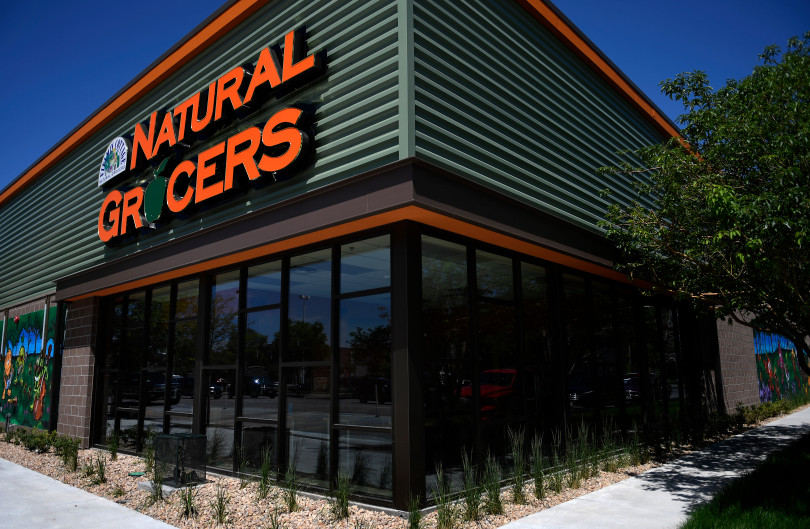Inside Natural Grocers by Vitamin Cottage’s newest store — its 37th in Colorado — shoppers will find all the hallmarks of the Lakewood-based specialty grocery chain.
All of the produce is organic, the dairy products pasture based, the eggs from free-range chickens, the meat antibiotic-free and all food free of artificial colors, flavors, sweeteners, preservatives, and hydrogenated or partially hydrogenated oils. A nutritional health coach is on staff and the customer literature files are full of take-home nutrition articles.
Plus, there are two flavors of Boulder-made Rowdy Mermaid Kombucha available by the growler. The new-build store is one of just a handful of Natural Grocers locations with the fermented tea on tap.
The Denver Design District store, 368 S. Broadway, celebrated its grand opening Wednesday morning — with a ceremonial kombucha toast, no less.
After years of aggressive growth, though, the natural grocery chain, founded in 1955 by Margaret and Philip Isely, will be scaling back on the number of new store openings moving forward, co-president Kemper Isely said in an interview last week.
“We were growing at 20 percent compounded per annum through last year. We have slowed down a little bit,” Isely said. “We’re going to be a little more strategic in the locations we pick in the future.”
At the time of its initial public offering, in 2012, Natural Grocers had 55 stores in 11 states. Today, they’re up to 137 stores in 19 states. In fiscal 2016, the chain opened 23 stores.
By the end of this fiscal year in September, the chain plans to have opened 14 to 16 stores, Isely said. In the future, they’ll probably average about 12 a year, or roughly one a month.
“Opening stores at a 20 percent clip is stressful on an organization. It’s time for us to give our organization a little bit of a breather,” he said. “It’s still a lot of stores.
“On a national level, we’re becoming a little more picky about the areas we go into just because of the heightened competition.”
In the immediate neighborhood of the Denver Design District store, that competition includes a Safeway and Sam’s Club across the street and a Whole Foods Market and Sprouts Farmers Market closer to Washington Park — all of which sell organic and natural products.
Not all specialty grocers have fared well as their more mainstream counterparts have jumped further into the lucrative natural and organic market. Earlier this year, Whole Foods announced plans to close nine stores nationwide — including two in Colorado — its largest one-time closure announcement in company history, after six straight quarters of same-store sales declines.
Natural Grocers hasn’t been entirely immune to the challenges of the food retailing environment, either.

Through the first six months of fiscal 2017, net sales were up 8.9 percent, or $30.6 million year over year, to $375.8 million, according to the company’s second-quarter results released in May. But after excluding new stores, comparable store sales were down 1.2 percent, or $4.1 million.
“The way we look at it is the more people that become educated about eating properly and eating well leads to a bigger market for us,” Isely said. “Yes, Walmart sells a little bit of organic, but they have no commitment to organic, and yes, so do King Soopers and a bunch of other grocery retailers, but they’re only selling it because it sells. They have no commitment to organic.
“That’s what we are about. That’s what our DNA is, having a commitment to high-quality organic produce and only organic produce. Whole Foods sells organic produce, but they mainly sell conventional produce. Same with Sprouts.”
The smaller format of Natural Grocers stores also helps set the chain apart from the competition, he said, comparing them to Aldi and Trader Joe’s.
“It’s just convenient to come into a smaller format store like ours and be able to confidently shop for only organic produce, only meats that are raised without antibiotics or hormones added, free-range eggs, pasture-based dairy products,” he said. “We’ve taken some of the decision-making out of buying healthy food.”
On Tuesday afternoon, employees were busy putting the final touches on the new store before a soft opening that evening. One group was in the demonstration kitchen, learning the ins and outs of its operation.
That demonstration kitchen, with its big windows facing South Broadway, will feature free programming on gluten-free muffins, probiotics, medicinal mushrooms, herbal pain relief and more, store manager Dawn Kennedy said.
And despite the slowdown in new store openings, it won’t be the only new Natural Grocers to open in Denver this year.
The downtown store on Platte Street, a fixture of the Lower Highland neighborhood since 2006, is closing July 11 to make way for a new office development. But it will be quickly replaced by a store at 38th Street and Brighton Boulevard in Denver’s River North Arts District, set to open July 13.
“We were disappointed that the property was sold. We weren’t given an opportunity to buy it,” Isely said. “There was a lot of unfortunate things that happened.”
Still, he said, Platte Street customers will have a number of nearby Natural Grocers locations to choose from, including the RiNo store and other newer outposts on Tennyson Street and East Colfax Avenue.
“We will continue to improve upon our standards and making it important for people to think about where their food comes from,” Isely said. “That’s one of our biggest missions.”
By EMILIE RUSCH

